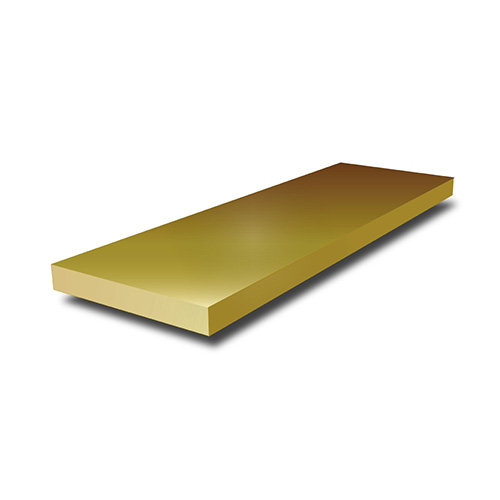- Characteristics: Composed of 70% copper and 30% zinc, C26000 is highly ductile and easy to work with. It is the most commonly used grade for brass flat bars and is suitable for a wide range of applications.
- Applications:Manufacturing electrical connectors, marine hardware, and decorative items.
Brass Flat Bar

Brass Flat Bar
Durable, Versatile, and High-Performance
Description
Brass flat bars are solid, rectangular metal bars made from a combination of copper and zinc. Known for their excellent machinability, corrosion resistance, and attractive appearance, brass flat bars are widely used in industries ranging from electrical to decorative applications. These bars provide a unique blend of strength, formability, and aesthetic appeal.
Key Features of Brass Flat Bars
- Corrosion Resistance:Brass is highly resistant to corrosion, especially in marine and humid environments. This makes brass flat bars an ideal material for outdoor use, plumbing systems, and applications exposed to moisture.
- Machinability:Brass flat bars are easy to machine, allowing for precise cutting, bending, and shaping. This makes them a popular choice for custom components and intricate designs, especially in applications where fine detailing is necessary.
- Strength and Durability:Brass offers a higher strength-to-weight ratio than other metals like aluminum. Brass flat bars provide structural integrity and durability, making them suitable for heavy-duty applications.
- Aesthetic Appeal:Brass has a distinctive gold-like appearance that enhances the look of products. It develops a natural patina over time, adding to its unique appeal in decorative applications.
- Conductivity:Brass has good electrical and thermal conductivity, which makes it ideal for electrical connections, switches, and other high-temperature environments.
Popular Grades of Brass Flat Bars
-
C26000 (Cartridge Brass)
-
C27000 (Muntz Metal)
-
C36000 (Free-Cutting Brass)
-
C33000 (Leaded Brass)
Industries Served by Brass Flat Bars
Electrical
Brass flat bars are widely used in manufacturing electrical connectors, terminals, and components due to their excellent conductivity and resistance to corrosion.
Marine
With outstanding resistance to corrosion in saltwater, brass flat bars are ideal for use in marine hardware, boat fittings, and valves.
Plumbing and HVAC
Brass flat bars are commonly used in the manufacturing of plumbing fittings, valves, faucets, and other hardware that require durability and corrosion resistance.
Automotive
Brass flat bars are used in precision automotive components such as connectors, engine parts, and trim.
Architectural and Furniture Design:
Brass is highly sought after for its aesthetic value and is used in decorative architectural applications and high-end furniture designs.
Industrial Manufacturing
Brass flat bars are used in heavy machinery, structural components, brackets, and gears.
Sizes and Specifications of Brass Flat Bars
Standard Thickness:
- Brass flat bars are available in a range of thicknesses, from 1mm up to 100mm, depending on the application.
Standard Width:
- Brass flat bars are commonly produced in widths from 10mm to 250mm, but custom sizes can be manufactured according to customer requirements.
Standard Length:
- Available in standard lengths ranging from 2 meters to 6 meters, but custom-cut lengths can be provided.
Finish Options:
- Mill Finish: A natural, unpolished surface suitable for industrial applications.
- Polished Finish: For decorative uses where a shiny surface is desired.
- Anodized Finish: To enhance corrosion resistance and create a uniform color.
Key Benefits of Brass Flat Bars
- Superior Corrosion Resistance:
Brass flat bars are resistant to corrosion from saltwater, moisture, and chemicals, making them ideal for use in challenging environments like marine, plumbing, and industrial settings. - Excellent Durability:
With good tensile strength and the ability to withstand wear, brass flat bars are ideal for components that require long-lasting performance, such as in heavy machinery, electrical systems, and marine applications. - Ease of Fabrication:
Brass is easy to work with, making it ideal for customized components. It can be easily cut, machined, welded, and formed into intricate shapes, allowing for flexibility in design. - Aesthetic Qualities:
The gold-like shine of brass flat bars makes them highly desirable for decorative uses, from furniture to jewelry to architectural designs. Over time, they develop a patina that gives them a distinctive, antique look. - Thermal and Electrical Conductivity:
Brass offers good thermal and electrical conductivity, making it suitable for high-performance electrical components like connectors, terminals, and heat exchangers. - Recyclability:
Brass is a highly recyclable material, which helps reduce environmental impact. Used brass can be melted and reused in manufacturing processes, making it an eco-friendly material choice.
